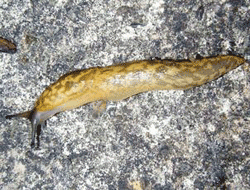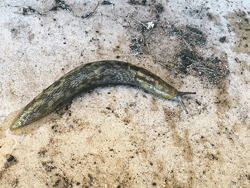The Royal Horticultural Society (RHS) is calling on gardeners to help locate a beneficial garden slug that could be on the verge of extinction in the UK.
The Yellow Cellar Slug, which feeds on decaying rather than live plant material and has been found in UK gardens for more than 130 years, is thought to be being usurped by the Green Cellar Slug. Since its arrival in the 70s, Yellow Cellar Slug numbers have dropped sharply.


Above: Yellow Cellar Slug (left) and the suspected usurper, the Green Cellar Slug.
As slugs return to gardens this spring, the charity is keen to know more about the two species’ interactions and any commonality in the places they frequent, with a view to understanding what it might mean for the future of our gardens and how they can be encouraged and protected.
While both slugs have large, green-yellow, patterned bodies, the Yellow Cellar Slug has a long yellow stripe running along the centre of its tail. As slugs are nocturnal, people are being asked to don torches and step out into their gardens after dark in the hope of recording them.
The RHS is asking gardenrs to:
- Take photographs showing the top view of each slug
- Match your slug to the ID guide on the RHS website to see what species you have
- Keep a note of how long you spent searching and how many of these slugs you found
- Also note if you find these slugs on a plant and what type of plant it is
- Record your findings on the RHS’ iRecord page
Imogen Cavadino, Research Assistant at the Royal Horticultural Society, said: “Of the 44 species of slug known to exist in the UK only nine are serious pests. Most are important composters and feed on fungi, lichens and algae. Slugs are also a valuable part of the garden ecosystem because they serve as an important food source for birds, hedgehogs and other garden visitors. A garden without slugs and snails would certainly be a different place and understanding the prevalence of some species is important in protecting them for the future.”
For more information about slugs and snails in gardens and to take part in the study, click here.